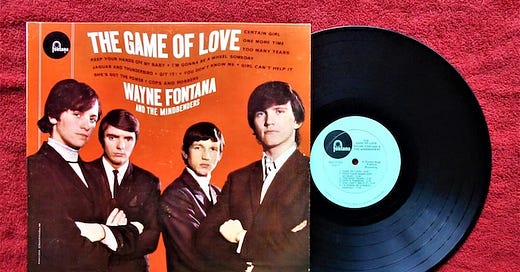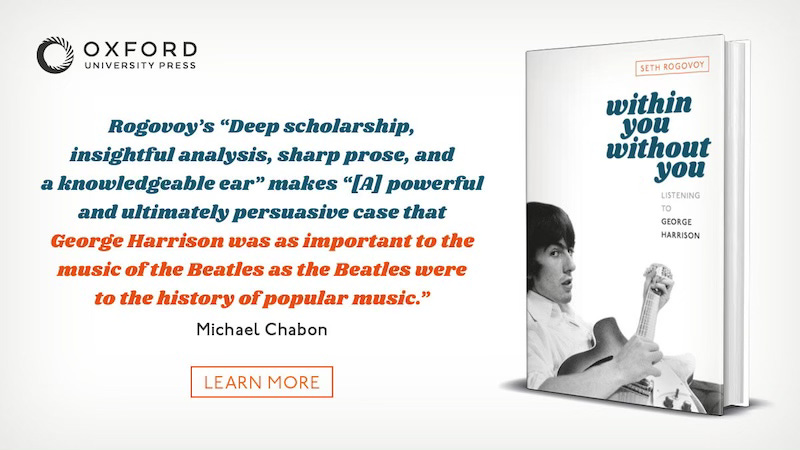Top 10: April 24, 1965
By spring 1965, the British Invasion was in full effect, with seven of the Top 10 songs in the U.S. by British artists, including the Kinks, Herman's Hermits, Wayne Fontana -- but not the Beatles!
THE SO-CALLED BRITISH INVASION was at its peak in 1965, the year after the Beatles took over the American pop charts. The Beatles’ success sparked a flood of interest in other British pop and rock groups, only some of which sounded like the Beatles. By the time late April/early May 1965 rolled around, about 30 of the Top 100 singles were by British artists. Even more spectacular, seven of the Top 10 hits were British in origin. A few of these became rock classics, but the majority of them were pop fluff or novelty numbers. Herman’s Hermits had two songs in the Top 10 the week of April 24, a rare week when the Beatles had no songs in the Top 10. Let’s take a closer look and listen to the toppermost of the poppermost that week in history.
Click on the above playlist to listen to the songs discussed below.
1. “Game of Love,” Wayne Fontana and the Mindbenders
At least in the U.S., Wayne Fontana – born Glyn Ellis in Manchester, England -- was something of a one-hit wonder with “Game of Love.” The song itself -- a kind of not-so-innocent effort at seduction -- is pretty vacant, with the stupid if memorable opening lines
The purpose of a man is to love a woman
And the purpose of a woman is to love a man
So come on, baby let’s start today
Come on, baby let’s play
The game of love….
The song goes on to invoke Adam and Eve in the Garden of Eden before getting really cringey with the line, “Love your daddy with all your might.” ‘Nuff said about the lyrics. The music, on the other hand, skirts a fine line between blues-rock and novelty, and the arrangement is clever enough to explain why this track went to number one, its grab-bag approach featuring girl-group harmonies vying with a deep-bass doo-wop vocal, a Bo Diddley beat during the bridge, and some delicious electric guitar fills. In that manner, it stands as an exhibit A of the British Invasion. Before the year was out, however, Fontana quit the Mindbenders (in mid-concert, no less). In 1967, Fontana scored a solo hit in the U.K. – the song “Pamela, Pamela,” written by Graham Gouldman, whom you know as a founding member of the 1970s art-rock group 10CC (“I’m Not in Love”) – but that was pretty much the end of Fontana’s career. The Mindbenders continued on without Fontana for a few more years, scoring several UK hits co-written by American songwriter Carole Bayer Sager.
2. “Mrs. Brown, You’ve Got a Lovely Daughter,” Herman’s Hermits
Written by English actor Trevor Peacock, “Mrs. Brown, You’ve Got a Lovely Daughter” was first sung and recorded by English actor Tom Courtenay in 1963 for a televised play. There were no mistaking the singer’s British origins when Peter Noone – the “Herman” of Herman’s Hermits – recorded the song in his loverly English accent. (Sometimes, British Invasion groups – including the Beatles to some extent – tried to disguise their accents to sound less English and more American.) With its low-key backup and simple production, the recording harked back to skiffle, that curious English blend of American folk, country, and blues with a hint of a rock ‘n’ roll backbeat. The song went to number one in the U.S.; curiously, it was not released as a single back home, nor was their other 1965 hit, “I’m Henry VIII, I Am.” By years end, Alvin and the Chipmunks covered “Mrs. Brown, You’ve Got a Lovely Daughter” for their album Chipmunks à Go-Go.
3. “I’m Telling You Now,” Freddie & the Dreamers
Freddie & the Dreamers were contemporaries of the Beatles, often grouped together with other Merseybeat bands, although they were from Manchester, not Liverpool. But on this song, first recorded in 1963, they do sound a lot like early Fab Four, with three-way harmonies and electric guitar that could have been played by George Harrison. Lead singer Freddie Garrity was something of a cut-up onstage (so was John Lennon early on), and the group was known for their synchronized dance steps, too. Their first UK hit was a cover of James Ray’s song “If You Gotta Make a Fool of Somebody”; Ray himself was the first to record a song called “I’ve Got My Mind Set on You,” which George Harrison took to number one in his 1987 cover version.
4. “I Know a Place,” Petula Clark
British singer Petula Clark won a Grammy Award for Best Contemporary (R&R) Vocal Performance of 1965 – Female for “I Know a Place,” her follow-up to her signature hit, “Downtown.” Clark totally deserved the honor – the single is a brilliant knockoff of Phil Spector’s girl-group hits, replete with a Spectorian “Wall of Sound” production and Clark’s dynamic, soulful vocals. The recording spent five weeks in the U.S. Top Ten and knowingly nodded to the Beatles. The “place” the singer knows sounds an awfully lot like the Cavern Club – the Liverpool nightclub where the Beatles first gained a following, described in the song as “A cellar full of noise.” Beatles manager Brian Epstein published a memoir a year earlier entitled A Cellarful of Noise. With 15 Top 40 hits in the U.S., Clark enjoyed a long and fruitful career, which included lending backup vocals to John Lennon’s “Give Peace a Chance.” Now age 92, Clark lives in Surrey, England.
5. “Stop! In the Name of Love,” The Supremes
The first hit on this week’s chart that is not by a British act held the top position in late March/early April. “Stop! In the Name of Love” was one of a string of mid-1960s hits that saw the Supremes vie with the Beatles for chart supremacy. It boasts all the signature elements of the Motown sound. Written and produced by Motown’s main production team Holland–Dozier–Holland, the song, like so many Motown hits, was a successful “crossover” hit, appealing equally to black and white audiences. It boasts one of the best cold opens of any pop hit in the rock era, launching right into the title lyric with horns blasting and drums pounding. One could undoubtedly argue this point, but to my ears it captures Diana Ross at her finest as a vocalist and the Supremes as a vocal act. The sad story of what followed just a few years later with the Supremes has been oft-told in books, movies, and musicals, but this hit -- nominated for the 1966 Grammy Award for Best Contemporary Rock & Roll Group Vocal Performance -- must be considered one of the all-time best by any group.
6. “Tired of Waiting for You,” The Kinks
In the wake of “You Really Got Me” and “All Day and All of the Night,” this was the Kinks highest-charting single until 1983’s “Come Dancing.” It was a bit of a turn for the London-based Kinks, whose previous hits relied largely on Dave Davies’ proto-metal guitar buzz. This time out, the song was largely driven by Ray Davies’ vocals and the song’s unusual chords and melody. There are hints of raga-rock here, with the song largely fueled by two alternating, droning guitar chords. Also, Ray Davies displays a sensitivity and vulnerability in his singing and in the lyrics, elements that would be expanded upon on subsequent songs and albums. A definite standout among British Invasion hits.
7. “I’ll Never Find Another You,” The Seekers
While the Seekers began their musical life in their native Australia, they first gained commercial success when they moved their home base to the UK. Whether or not you want to consider them a British Invasion outfit is up to you, but there is no mistaking the influence of the Beatles on their sound, particularly in the guitar riff that opens the song. But when the group starts singing the listener realizes they are as much in Peter, Paul and Mary folk-pop territory than anywhere else, and for better or worse. To my ears, it’s worse. The vibrato-laden vocals and ornate harmonies are too precious and cloying. Nevertheless, the song got as high as number four on the U.S. charts. It’s no surprise that when the group was reconstituted a few years later as the New Seekers, they had a hit with “I’d Like to Teach the World to Sing (In Perfect Harmony),” which was a Coca-Cola jingle before the group recorded it as a pop song.
8. “The Clapping Song (Clap Pat Clap Slap),” Shirley Ellis
Like her previous hit, “The Name Game,” Shirley Ellis’s “The Clapping Song” had roots in playground chants. Ellis was born in the Bronx in 1929, and in what was unusual at the time, she typically co-wrote her own songs. Much of “The Clapping Song” consists of Ellis giving spoken-word dance instructions. Although her hits tended to be novelties, they were embedded in deep, funky R&B settings, and her talk-sing approach prefigured rap music to a significant extent.
9. “Shotgun,” Jr. Walker & the All Stars
Speaking of R&B, Jr. Walker’s “Shotgun” is one of the foundational numbers of the genre, not surprising given that Walker was already fronting his own bands in the mid-1950s. Not unlike Ellis, Walker also talk-sings his lyrics with some dance instruction. But next to his gritty, soulful vocals, it’s the Hammond B-3 organ and particularly Walker’s saxophone that distinguishes this deceptively simple number, which is a basic, three-minute funk jam on one chord. This was also a Motown production, on the opposite end of the musical spectrum from “Stop! In the Name of Love.” Surprisingly, this was Walker’s debut as a lead vocalist; he stepped in front of the microphone when the hired singer failed to show up at the recording session. He never intended for his vocal to be used on the finalized version of the song, figuring he was just laying down a guide vocal. Thank goodness Berry Gordy decided to run with Walker’s take.
10. “Silhouettes,” Herman’s Hermits
And now we come full circle back to the British Invasion and Herman’s Hermits. “Silhouettes” was originally a Top 3 hit by the doo-wop group the Rays in 1957. Peter Noone is said to have first heard it on American Armed Forces Radio, and Herman’s Hermits watered-down version made it into the Top 5. I’ve included the glorious original version by the Rays on the playlist for comparison purposes. To my ears, there is no comparison. In this case, at least, the Americans beat the British.
Reference: https://www.billboard.com/charts/hot-100/1965-04-24/
In solidarity,
“Well, I don’t want to go on the roof.” -- George Harrison
Hey, did you like this edition of Everything Is Broken? If so, please consider clicking on the “LIKE” button at the very end of this message. It matters to the gods of Substack.
Roll Call: Founding Members
Anne Fredericks
Anonymous (9)
Susan Bang
Erik Bruun
Jane & Andy Cohen
Jeffrey N. Cohen
Nadine Habousha Cohen
Fred Collins
Ian Feldman
Fluffforager
Benno Friedman
Amy and Howard Friedner
Jackie and Larry Horn
Richard Koplin
Paul Paradiso
Steve and Helice Picheny
David Rubman
Spencertown Academy Arts Center
Elisa Spungen and Rob Bildner/Berkshires Farm Table Cookbook
Julie Abraham Stone
Mary Herr Tally
Daniel Wollman and Debra Pollack






Wow! You nailed the soundtrack of my youth...and I still remember all the words. I love good music of all genres, but as Andrew Jackson wrote: "1965: (was) The Most Revolutionary Year in (popular) Music." Thank you!